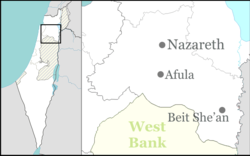Ein Mahil
Ein Mahil
| |
|---|---|
Local council (from 1964) | |
| Hebrew transcription(s) | |
| • ISO 259 | ʕein Máhel |
 | |
| Coordinates: 32°43′23″N 35°21′08″E / 32.72306°N 35.35222°E | |
| Grid position | 183/236 PAL |
| Country | |
| District | Northern |
| Area | |
| • Total | 5,203 dunams (5.203 km2 or 2.009 sq mi) |
| Population (2022)[1] | |
| • Total | 13,931 |
| • Density | 2,700/km2 (6,900/sq mi) |
| Name meaning | "The spring of the barren land."[2] |
Ein Mahil (
History
Ottoman Empire
In 1596, Ein Mahil appeared in
In 1838 it was noted as a Muslim village in the Nazareth district.[5][6]
The French explorer Victor Guérin passed by the village in the 1875, and described it as having 10 poor dwellings, surrounded by gardens of olives, figs and pomegranates.[7] In 1881 the PEF's Survey of Western Palestine (SWP) described it as a "Stone village, situated on very high ground, surrounded by figs and olives and arable land. It contains about 200 Moslems, and has near it a fine group of springs."[8]
A population list from about 1887 showed that ’Ain Mahil had about 195 Muslim inhabitants.[9]
British Mandate
In the 1922 census of Palestine conducted by the British Mandate authorities, 'Ain Mahel had a population of 516, all Muslims.[10] The population increased in the 1931 census of Palestine to 628, of whom 1 was Christian and the rest Muslims, in a total of 109 occupied houses.[11]
In the 1945 statistics the population was 1,040 Muslims,[12] with 13,390 dunams of land, according to an official land and population survey.[13] Of this, 1,486 dunams were for plantations and irrigable land, 6,748 for cereals,[14] while 35 dunams were built-up land.[15]
See also
References
- ^ a b "Regional Statistics". Israel Central Bureau of Statistics. Retrieved 21 March 2024.
- ^ Palmer, 1881, p. 122
- ^ Hütteroth and Abdulfattah, 1977, p. 189
- ^ Karmon, 1960, p. 167 Archived 2019-12-22 at the Wayback Machine
- ^ Robinson and Smith, 1841, vol 3, 2nd appendix, p. 132
- ^ Robinson and Smith, 1841, vol 3, p. 209
- ^ Guérin, 1880, p. 382
- ^ Conder and Kitchener, 1881, SWP I, p. 362
- ^ Schumacher, 1888, p. 184
- ^ Barron, 1923, Table XI, Sub-district of Nazareth, p. 38
- ^ Mills, 1932, p.73
- ^ Department of Statistics, 1945, p. 8
- ^ Government of Palestine, Department of Statistics. Village Statistics, April, 1945. Quoted in Hadawi, 1970, p. 62
- ^ Government of Palestine, Department of Statistics. Village Statistics, April, 1945. Quoted in Hadawi, 1970, p. 109
- ^ Government of Palestine, Department of Statistics. Village Statistics, April, 1945. Quoted in Hadawi, 1970, p. 159
Bibliography
- Barron, J.B., ed. (1923). Palestine: Report and General Abstracts of the Census of 1922. Government of Palestine.
- Conder, C.R.; Kitchener, H.H. (1881). The Survey of Western Palestine: Memoirs of the Topography, Orography, Hydrography, and Archaeology. Vol. 1. London: Committee of the Palestine Exploration Fund.
- Department of Statistics (1945). Village Statistics, April, 1945. Government of Palestine.
- Grootkerk, Salomon E. (2000). Ancient sites in Galilee: a toponymic gazetteer (Illustrated ed.). BRILL. ISBN 90-04-11535-8. (p. 292)
- Guérin, V. (1880). Description Géographique Historique et Archéologique de la Palestine (in French). Vol. 3: Galilee, pt. 1. Paris: L'Imprimerie Nationale.
- Karmon, Y. (1960). "An Analysis of Jacotin's Map of Palestine" (PDF). Israel Exploration Journal. 10 (3, 4): 155–173, 244–253. Archived from the original (PDF) on 2019-12-22. Retrieved 2015-04-13.
- Hadawi, S. (1970). "Village Statistics of 1945: A Classification of Land and Area ownership in Palestine". Palestine Liberation Organization Research Center.
{{cite journal}}: Cite journal requires|journal=(help) - Hütteroth, Wolf-Dieter; Abdulfattah, Kamal (1977). Historical Geography of Palestine, Transjordan and Southern Syria in the Late 16th Century. Erlanger Geographische Arbeiten, Sonderband 5. Erlangen, Germany: Vorstand der Fränkischen Geographischen Gesellschaft. ISBN 3-920405-41-2.
- Mills, E., ed. (1932). Census of Palestine 1931. Population of Villages, Towns and Administrative Areas. Jerusalem: Government of Palestine.
- Palmer, E.H. (1881). The Survey of Western Palestine: Arabic and English Name Lists Collected During the Survey by Lieutenants Conder and Kitchener, R. E. Transliterated and Explained by E.H. Palmer. Committee of the Palestine Exploration Fund.
- Rhode, H. (1979). Administration and Population of the Sancak of Safed in the Sixteenth Century. Columbia University. Archived from the original on 2020-03-01. Retrieved 2017-11-03.
- Robinson, E.; Smith, E. (1841). Biblical Researches in Palestine, Mount Sinai and Arabia Petraea: A Journal of Travels in the year 1838. Vol. 3. Boston: Crocker & Brewster.
- Schumacher, G. (1888). "Population list of the Liwa of Akka". Quarterly Statement - Palestine Exploration Fund. 20: 169–191.
External links
- Welcome To 'Ayn Mahil
- Survey of Western Palestine, Map 6: IAA, Wikimedia commons


